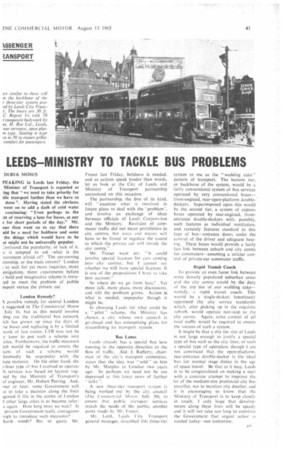LEEDS-MINISTRY TO TACKLE BUS PROBLEMS
Page 43

If you've noticed an error in this article please click here to report it so we can fix it.
DEREK MOSES PEAKING in Leeds last Friday, the Minister of Transport is reported as ing that " we need to take priority for I)lic transport further than we have so done ". Having stated the obvious, went on to add a dash of cold water continuing: " Even perhaps to the Int of reserving a lane for buses, at any e for short periods of the day." Mr. mer then went on to say that there u ld be a need for boldness and some the things which would have to be se might not be universally popular. :onfound the popularity, or lack of it.
e is tempted to ask -what is the veroment afraid of? The car-owning ctorship, or the trade unions? London ; to wait for yet more inquiries, more estigations, more experiments before bold and imaginative scheme is intro.: :ed to meet the problem of public nsport versus the private car.
London Remedy? .
k possible remedy for central London s„suggested in The Commercial Minor PilY 16. hut as this would involve ting out the traditional bus network ich has grown up since the days of sie, buses and replacing it by a limited work of fast routes. LIR may not be .y keen to put such a scheme into etiee. Furthermore, the traffic measures ich would be required to ensure the ct,:ss of such a scheme would Joubtedly be unpopular with the vale motorist. On the other hand. the frliner type of bus I evolved to operate ti services was based on layouts sueted by the Ministry of Transport's ef engineer. Mr. Hubert Perring. And, tner or later. some Government will re to take a decision along the lines :gested it' life in the centre of London i other large cities is to become toler7
e again. How long must we wait? Is present Government really courageous
5tigh to in such measures? iarsh words? But to quo[eMr.
Fraser last Friday, boldness is needed, and as actions speak louder than Words, let us look at the CiLy of Leeds and 'Ministry of Transport partnership announced on this occasion.
The partnership, the first of its kind, will -! examine what is involved in future plans to deal with the problem and involve art exchange of ideas between officials of Leeds Corporation and the Ministry: Restraint of commuter traffic did not mean prohibition in city centres. but ways and means will have to be found to regulate the extent to which the private car will invade the city centre."
-Mr. Fraser went on: " It could involve special licences for cars coming , into city centres, hut I cannot say whether we will have special licences. It is one of the propositions I have to take into account."
So where do we go from here? ..Yet more talk, more 'plans. more discussions. and still the Problem grows. Action is what is needed, unpopular though it might. be.
In choosing Leeds for what could he a " pilot " scheme, the Ministry has chosen is city whose own council is go-ahead and has enterprising plans for StreaMiining its transport system.
Bus Lanes Leeds already has a special bus lime running in the opposite direction to the flow of traffic. Aid.. J. Rafferty, chairman of the city's transport committee. states that the idea was "sold " to him by Mr. Marples in London two years ago. So perhaps we need not he too depressed at this latest news of further " talks ".
A new three-tier iransport system is being worked out by the city council I The Commercial ,Wotor. July 301, to ensure that public iranspori services match the needs of the public, another
point made by Mr. Fraser. •
Mr:. Lord, Leeds City Transport general manager, described this three-tier
system to me as the "wedding cake" pattern of transport. The bottom tier, or backbone of the system, would be a fairly conventional system of bus services operated by very conventional busesfront-engined, rear-open-platform doubledeckers. Superimposed upon this would be the second tier, a system of express buses operated by rear-engined, frontentrance double-deckers with, possibly, such features as individual ventilation, and certainly features standard to this type of bus—entrance doors under the control of the driver and adequate heating. These buses -would provide a fairly fast link between suburb and city centre for commuters—assuming a stricter control of private-car commuter traffic.
Rapid Transit Coach
"ro provide an even faster link between sonic denselyPopulated Suburban areas and the city centre would be the duty of the top" tieof_ our wedding cakenamelY, a rapid transit coach. This woOld be a single-decker; luxuriously appointed (by city service standards) which,after picking up in the requisite. suburb, would operate non-stop to 0!e city centre. Again, strict control of all road traffic would be required to ensure the success of such a system, It might be that a city the size of Leeds is not large enough to justify a special type of bus such as the city liner, or such a special type of operation. though I am not convinced that the open-platform, rear-entrance double-decker is the ideal bus for normal stage duties in the age of space travel. Be that as it may, Leeds is to be congratulated on making a start with a concrete attempt to improve the lot of the medium-size provincial city bus traveller, not to mention city dweller, and it is encouraging. to know that the Ministry of Transport is to keep closely in touch. I only hope that developments along these lines will be speedy and it will not take too long to convince the Government that urgent actior is needed today—not tomorrow,




























































































































